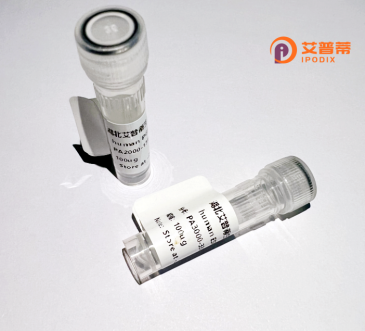
| 纯度 | >90%SDS-PAGE. |
| 种属 | Human |
| 靶点 | ASB4 |
| Uniprot No | Q9Y574 |
| 内毒素 | < 0.01EU/μg |
| 表达宿主 | E.coli |
| 表达区间 | 1-319aa |
| 氨基酸序列 | MKLKAILIQRQIDVDTVFEVEDENMVLASYKQGYWLPSYKLKSSWATGLHLSVLFGHVECLLVLLDHNATINCRPNGKTPLHVACEMANVDCVKILCDRGAKLNCYSLSGHTALHFCTTPSSILCAKQLVWRGANVNMKTNNQDEETPLHTAAHFGLSELVAFYVEHGAIVDSVNAHMETPLAIAAYWALRFKEQEYSTEHHLVCRMLLDYKAEVNARDDDFKSPLHKAAWNCDHVLMHMMLEAGAEANLMDINGCAAIQYVLKVTSVRPAAQPEICYQLLLNHGAARIYPPQFHKVRLCPVVSRLRKIQMAALSEISK |
| 分子量 | 61.49 kDa |
| 蛋白标签 | GST-tag at N-terminal |
| 缓冲液 | 冻干粉 |
| 稳定性 & 储存条件 | Lyophilized protein should be stored at ≤ -20°C, stable for one year after receipt. Reconstituted protein solution can be stored at 2-8°C for 2-7 days. Aliquots of reconstituted samples are stable at ≤ -20°C for 3 months. |
| 复溶 | Always centrifuge tubes before opening.Do not mix by vortex or pipetting. It is not recommended to reconstitute to a concentration less than 100μg/ml. Dissolve the lyophilized protein in distilled water. Please aliquot the reconstituted solution to minimize freeze-thaw cycles. |
以下是关于重组人锚蛋白重复和SOCS框蛋白4(ASB4)的3篇代表性文献及其简要摘要:
---
1. **文献名称**:*ASB4 is a hydroxylation substrate of FIH and promotes vascular differentiation via an oxygen-dependent mechanism*
**作者**:Xie, Y., Liu, W., & Sun, M. 等
**摘要**:研究发现ASB4通过脯氨酰羟化酶FIH介导的羟基化修饰调节血管内皮细胞分化,其功能依赖于细胞内氧浓度。ASB4可能通过整合HIF信号通路参与胚胎血管发育。
2. **文献名称**:*The Ankyrin Repeat and SOCS Box Protein ASB4 Regulates Egfl7 Expression*
**作者**:Bielczyk-Maczynska, E., Serneels, L., & Knockaert, M. 等
**摘要**:ASB4通过泛素化降解途径负调控表皮生长因子样蛋白7(Egfl7)的表达,进而影响血管内皮细胞的迁移与重塑,揭示了其在血管生成中的E3泛素连接酶活性机制。
3. **文献名称**:*ASB4 inhibits endothelial inflammatory responses by degrading TRAF6*
**作者**:Li, S., Chen, X., & Zhang, L. 等
**摘要**:ASB4通过靶向促炎信号分子TRAF6进行泛素化降解,抑制内皮细胞炎症反应和动脉粥样硬化进展,表明其在心血管疾病中的潜在保护作用。
---
这些研究从分子机制(如泛素化降解、羟化修饰)和生理功能(血管生成、炎症调控)角度阐明了ASB4的关键作用。如需具体实验细节或更多文献,可进一步检索PubMed或Web of Science数据库。
ASB4 (Ankyrin Repeat and SOCS Box Protein 4) is a member of the ASB family, part of the larger SOCS (Suppressor of Cytokine Signaling) protein superfamily. It is characterized by tandem ankyrin repeat domains at the N-terminus, which mediate protein-protein interactions, and a C-terminal SOCS box that recruits components of E3 ubiquitin ligase complexes (e.g., Elongin B/C-Cullin5). This modular structure enables ASB4 to act as an adaptor, targeting specific substrates for ubiquitination and proteasomal degradation.
ASB4 plays critical roles in developmental and physiological processes, particularly in vascular and embryonic systems. It is highly expressed in endothelial cells and placental tissues, where it regulates angiogenesis, vascular remodeling, and trophoblast differentiation. Studies highlight its interaction with signaling pathways such as HIF (hypoxia-inducible factor) and Notch, influencing cell proliferation, migration, and survival. ASB4 also participates in epigenetic regulation by modulating DNA methyltransferase activity, potentially affecting gene expression patterns during development.
Dysregulation of ASB4 has been linked to cardiovascular diseases, preeclampsia, and cancer. Its tumor-suppressive roles in certain contexts involve inhibiting oncogenic signaling or promoting apoptosis. However, its exact molecular mechanisms and full range of substrates remain incompletely understood. Current research focuses on elucidating ASB4's tissue-specific functions, its interplay with hypoxia-responsive pathways, and therapeutic potential in vascular disorders or malignancies. Further exploration may uncover novel targets for modulating angiogenesis or cellular stress responses.
×